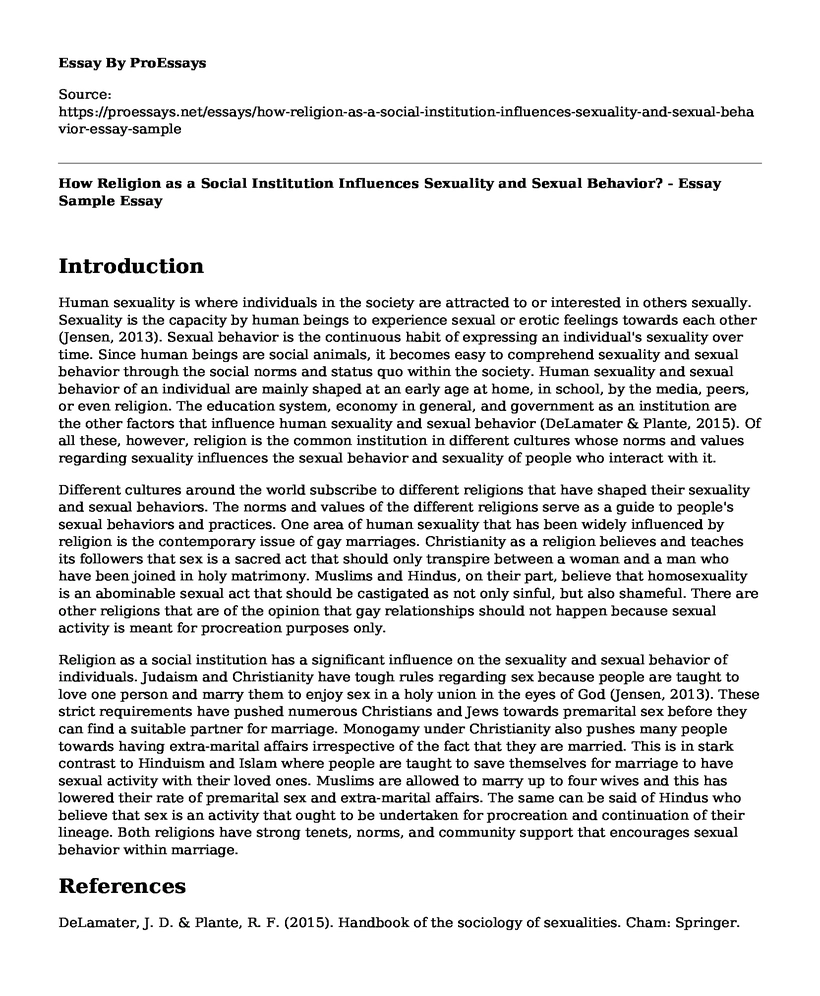Introduction
Human sexuality is where individuals in the society are attracted to or interested in others sexually. Sexuality is the capacity by human beings to experience sexual or erotic feelings towards each other (Jensen, 2013). Sexual behavior is the continuous habit of expressing an individual's sexuality over time. Since human beings are social animals, it becomes easy to comprehend sexuality and sexual behavior through the social norms and status quo within the society. Human sexuality and sexual behavior of an individual are mainly shaped at an early age at home, in school, by the media, peers, or even religion. The education system, economy in general, and government as an institution are the other factors that influence human sexuality and sexual behavior (DeLamater & Plante, 2015). Of all these, however, religion is the common institution in different cultures whose norms and values regarding sexuality influences the sexual behavior and sexuality of people who interact with it.
Different cultures around the world subscribe to different religions that have shaped their sexuality and sexual behaviors. The norms and values of the different religions serve as a guide to people's sexual behaviors and practices. One area of human sexuality that has been widely influenced by religion is the contemporary issue of gay marriages. Christianity as a religion believes and teaches its followers that sex is a sacred act that should only transpire between a woman and a man who have been joined in holy matrimony. Muslims and Hindus, on their part, believe that homosexuality is an abominable sexual act that should be castigated as not only sinful, but also shameful. There are other religions that are of the opinion that gay relationships should not happen because sexual activity is meant for procreation purposes only.
Religion as a social institution has a significant influence on the sexuality and sexual behavior of individuals. Judaism and Christianity have tough rules regarding sex because people are taught to love one person and marry them to enjoy sex in a holy union in the eyes of God (Jensen, 2013). These strict requirements have pushed numerous Christians and Jews towards premarital sex before they can find a suitable partner for marriage. Monogamy under Christianity also pushes many people towards having extra-marital affairs irrespective of the fact that they are married. This is in stark contrast to Hinduism and Islam where people are taught to save themselves for marriage to have sexual activity with their loved ones. Muslims are allowed to marry up to four wives and this has lowered their rate of premarital sex and extra-marital affairs. The same can be said of Hindus who believe that sex is an activity that ought to be undertaken for procreation and continuation of their lineage. Both religions have strong tenets, norms, and community support that encourages sexual behavior within marriage.
References
DeLamater, J. D. & Plante, R. F. (2015). Handbook of the sociology of sexualities. Cham: Springer.
Jensen, D. H. (2013). God, desire, and a theology of human sexuality. Louisville, Ky.: Westminster John Knox Press.
Cite this page
How Religion as a Social Institution Influences Sexuality and Sexual Behavior? - Essay Sample. (2022, Jul 27). Retrieved from https://proessays.net/essays/how-religion-as-a-social-institution-influences-sexuality-and-sexual-behavior-essay-sample
If you are the original author of this essay and no longer wish to have it published on the ProEssays website, please click below to request its removal:
- Essay on Outdated Marriage
- Race, Religion and Cultural Competency Paper Example
- Research Paper on God Existence
- Speaking Situations Essay Example
- Essay Sample on Social Structure: Uncovering New Connections and Uses
- Teamwork in Health Care: Quality Care Through Communication & Problem Solving - Essay Sample
- Free Essay - Cultural Artifacts and Traditions: Exploring the Rich Heritage of Islamic Objects and Practices







